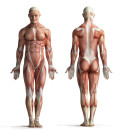Proprioceptive Neuromuscular Facilitation in Orthopedic Patients
This two-day, evidenced based, laboratory intensive course will focus on teaching a historically useful manual therapy technique, Proprioceptive Neuromuscular Facilitation (PNF). The course introduces PNF as a manual therapy and exercise intervention technique to address common pathologies of both upper and lower extremities. The course is intended to provide the clinician with the skill to rehabilitate the patient with a hands-on, integrative approach. This will be accomplished through a combination of lecture, demonstration, and significant lab time. The structured sessions are aimed at emphasizing important concepts in neurophysiology and motor learning to improve neuromuscular control in orthopedic patients. Mastery of these techniques requires a solid foundation in basic anatomy and the pathomechanics of the shoulder and hip. Attendees will learn useful terminology, basic procedures, and techniques.
Participants will learn to successfully apply PNF techniques in a manner that each patient-centered session is both therapeutic intervention and assessment or evaluation. The clinician will learn to develop and sequence a dynamic treatment plan incorporating PNF techniques that can be used for conservative and post-operative approaches. Current clinical evidence supports the combination of these treatments when properly performed and prescribed by a skilled clinician. Strategies for documentation and coding will also be covered.
This is an intermediate level course.
Course Dates & Locations
Faculty
Educational Credit
A certificate of attendance for 15 Contact Hourswill be awarded to each participant. All Therapy Network Seminars are pre‐approved for CEUs in the state where the course is conducted when required for PT, OT, ATs & Assistants.
Therapy Network, Inc. (BOC AP#: P2563) is approved by the Board of Certification, Inc. to provide continuing education to Certified Athletic Trainers. Our seminars are eligible for a maximum of 15 Category A hours/CEUs. ATs should claim only those hours actually spent in the educational program.
AOTA Approved Provider of Continuing Education # 3073 Category 1 Domain of OT. The assignment of AOTA CEUs does not imply endorsements of specific course content, products, or clinical procedures by AOTA
Audience
This course is intended for PTs, PTAs, OTs, OTAs and ATs
NOTE: Nothing in this course is to enable or permit the learner to apply techniques outside of the scope of practice in their individual state and discipline.
Objectives
- Demonstrate an understanding of the PNF concept and the neurophysiology behind the PNF principles
- Identify foundational principles of exercise and physiological adaptation. Correctly explain and differentiate motor learning, strength, power, hypertrophy, and endurance
- Demonstrate clinical skills to determine a patient’s neuromuscular ability and select appropriate PNF therapy interventions based on understanding of anatomy and pathology in conjunction with patient responses
- Perform basic PNF manual therapy techniques to facilitate neuromuscular control and improve patient recovery
- Identify appropriate PNF terms for documentation and CPT coding for charges
Schedule
-
Day 1
8:00 Registration and Continental Breakfast 8:30 Integrating the Neuro-Musculo-Skeletal System: A philosophy of rehabilitation for restoring
function and its clinical implications8:45 Case Study I 9:00 Review of the Nervous System
CNS
Motor Cortex
- Organization
- Overflow
Cerebellum
Brochman’s Area (visual/verbal inputs)
Frontal
Spinal Cord
Reflexes
Autogenic Inhibition
Reciprocal Inhibition
Muscle
Agonist/Antagonist
Summation10:00 BREAK 10:15 Basic Principles and Procedures
Application of Resistance
Neural Overflow/Irradiation
Manual Contact
Patient and Therapist Body Position
Verbal Commands
Vision
Traction & Approximation
Timing
Patterns10:45 PNF Techniques
Rhythmic Initiation
Hold Relax
Contract Relax
Dynamic Reversals
Stabilizing Reversals
Rhythmic Stabilization
Summarizing Techniques and Their Goals11:15 Choosing Your Technique
Using principles not protocols for progressions12:00 Lunch (On your own) 1:00 LAB: Introducing the Patterns - Upper Extremity
Demonstration and Practice Lab
Shoulder
Scapula
Elbow
Wrist & Hand3:00 BREAK 3:15 LAB: Introducing the Patterns - Lower Extremity
Demonstration and Practice Lab
Ankle
Knee
Hip
Gait & Trunk5:30 Questions and Adjourn -
Day 2
8:00 Shoulder Case Studies
Facilitation of the elbow, wrist, and hand
Scapular Motion9:00 Elbow Case Studies
UCL Injuries
Biceps Rupture10:00 BREAK 10:15 Wrist & Hand Complex Case Studies 10:45 Hip Case Studies
Hip Flexor Injuries
Hamstring Injuries
Adductor/Groin Injuries11:00 Knee Case Studies 12:00 Lunch (On your own) 1:00 LAB: Where to start… How to finish…Upper Extremity
Demonstration & Practice Lab2:30 BREAK 2:45 LAB: Lower Extremity
Demonstration & Practice Lab4:15 Variations of the techniques
Knee Flexion vs. Extension
Elbow Flexion vs. Extension
Creating Functional Patterns4:30 Treatment Planning and Clinical Pearls: Putting it all together 5:00 Questions and Adjourn
Cancellation Policy
Registration fee less a $75 administrative charge is refundable if cancellation received 14 days prior to program date. No refunds will be given after that time. Therapy Network, Inc. reserves the right to cancel a seminar and will refund in full the registration fee only. TNI is NOT responsible for registrants nonrefundable airfare, accommodations or fees.

Participants Comments